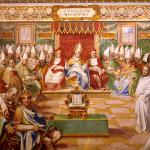There’s been a flurry of books about Christianity and Economics in the last year, including the following:
Michael Rhodes and Robby Holt, Practicing the King’s Economy: Honoring Jesus in How We Work, Earn, Spend, Save, and Give (Grand Rapids, MI: Baker, 2018).
John D. Barry, Jesus’ Economy: A Biblical View of Poverty, the Currency of Love, and a Pattern for Lasting Change (New Kensington, PA: Whitaker House, 2019).
Michael Barram, Missional Economics: Biblical Justice and Christian Formation (Grand Rapids, MI: Eerdmans, 2018).
Robert Myles (ed.), Class Struggle in the New Testament (Lanham: Lexington/Fortress, forthcoming 2019).
Kenneth Barnes, Redeeming Capitalism (Grand Rapids, MI: Eerdmans 2018).
Ian Harper, Confessions of a Meddlesome Economist (Acorn, 2019).
As it is, Professor Ian Harper, a leading Australian economist, economics professor, current dean of the Melbourne Business School, senior advisor to Deloitte Access Economics, and board member of the reserve bank of Australia, reviews two of these books:
John D. Barry, Jesus’ Economy: A Biblical View of Poverty, The Currency of Love, and a Pattern for Lasting Change, New Kensington, PA: Whitaker House, 2019, 178 pp. no index.
Michael Rhodes and Robby Holt (with Brian Fikkert), Practicing the King’s Economy: Honoring Jesus in How We Work, Earn, Spend, Save, and Give, Grand Rapids, MI: Baker Books, 2018, 317 pp. including index.
These two books offer practical strategies for Christians seeking to ‘work out their salvation’ in the everyday business of meeting our material needs and those of others, whether in our midst or beyond. The first focuses on alleviating poverty, specifically, while the second takes a broader view of economic life. In both cases, the authors draw lessons from the Bible, both the Old and New Testaments, about how Christians should relate to other people, believers and non-believers, when it comes to commercial relations. Unsurprisingly, the Bible teaches us that we are far more valuable to God than the sum of what we are capable of producing and consuming, and that to value human beings according to these standards is to do the very opposite of ‘loving our neighbours’ as God loves us. In this sense, God’s ‘economy’ runs on very different principles to real-world economies where goods and services are traded and prices determined with little or no thought given to the underlying worth of the people for whom this activity is notionally beneficial. This is where the Gospel transforms a believer’s attitude to economic relations, or ought to do so. Yet the pressure to conform to worldly approaches to wealth creation are intense. How can Christians live in a world drunk on material prosperity and often blind to spiritual welfare without succumbing themselves? And how can Christians love their neighbours in practical ways that build them up and show them their real identity in Jesus when so much of the focus of real-world economic relations is narrowly material? Neither of these books seeks a wholesale reconstruction of the way economies work or even to advance a Christian vision of a transformed economics, more attuned to Kingdom values than worldly priorities. Rather they are both thoughtful and practical studies, informed by Biblical priorities, that show how Christians can live in the worldly economy and yet not be of it, and in doing so to witness to the abundance of God’s love rather than the scarcity of material goods and services.












